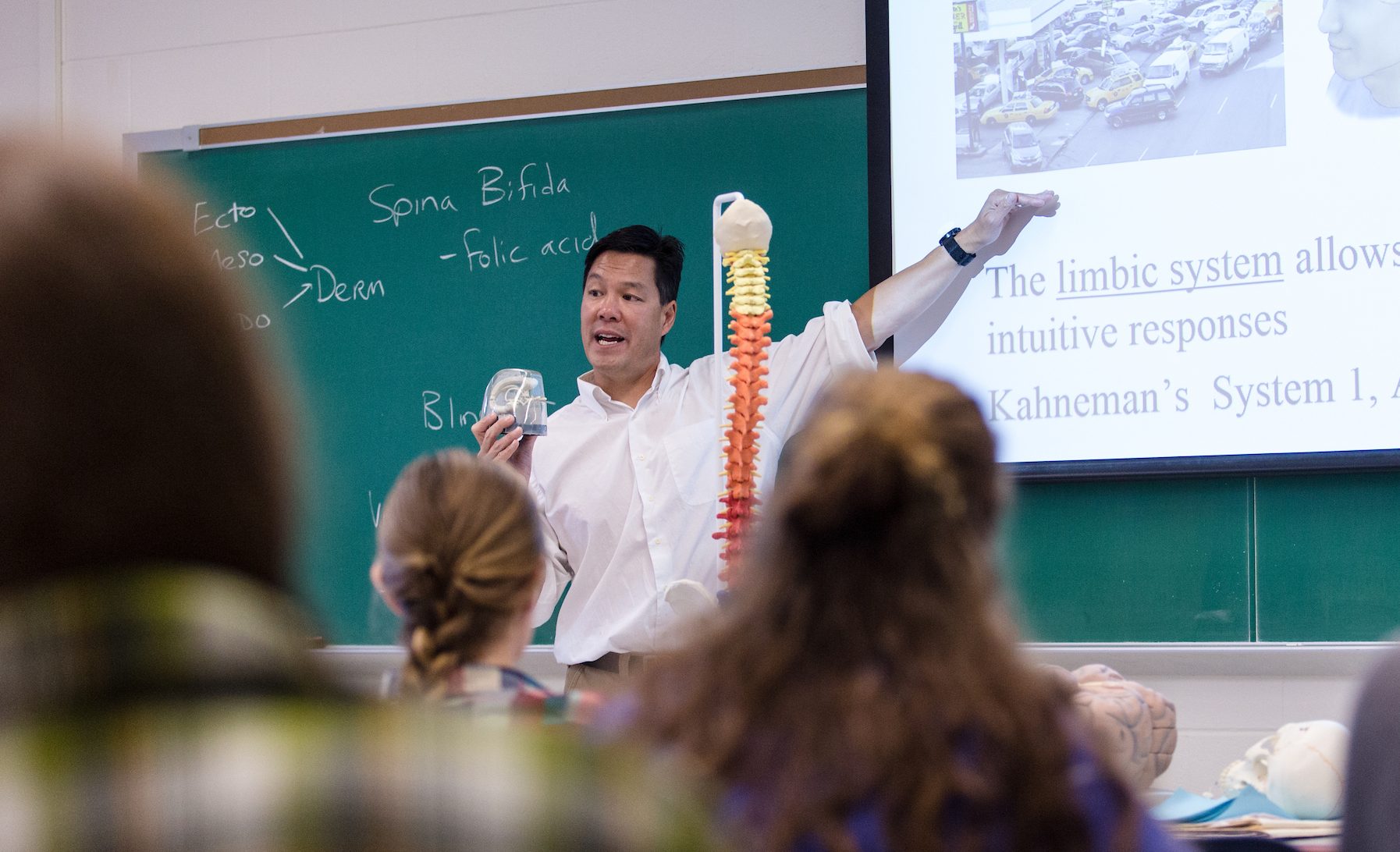Hands-on learning is a big part of UNC Asheville’s liberal arts approach to education. Students can apply their knowledge and explore their interests and potential careers through student clubs and organizations, internships, and by attending and participating in exhibitions and other art events.

Lookout Observatory
UNC Asheville Astronomy students experience course concepts first-hand utilizing the observatory’s laboratory capabilities.

PARI
Students have opportunities to perform research in radio astronomy at this facility, which was formerly used by NASA

Who We Are
With daily one-on-one guidance from full-time faculty members, UNC Asheville’s Department of Physics is a great place to study the laws that make the world go around, including time, space, force, matter, motion, and energy. Our faculty are passionate about their research in molecular, atomic, nuclear, and environmental physics, along with astronomy and astrophysics. Whether you’re hanging out in the physics study lounge or you’re a member of our award-winning chapter of the national physics honors society, Sigma Pi Sigma, it’s easy to feel at home in our close-knit department.
What You’ll Learn
Physics majors become expert critical thinkers. Along with gaining a strong knowledge base in mathematics, chemistry, computer science, astronomy, and fundamental engineering, you’ll test theories, conduct experiments, and solve problems—skills that apply to a broad range of fields. Physics majors are encouraged to customize their curriculum according to their interests and goals, and many participate in UNC Asheville’s nationally-recognized undergraduate research program. The astronomy minor is also popular; at UNC Asheville’s Lookout Observatory, astronomy faculty and students guide visitors as they explore the skies. Our graduates are prepared for graduate study or immediate, successful careers in science, engineering, medicine, law, business, education, and more.
Our Commitment to Diversity, Equity, and Inclusion
The Department of Physics and Astronomy at UNC Asheville believes that diverse perspectives and lived experiences enrich and strengthen both our educational and scientific work. Our faculty and staff aim to create an equitable, inclusive, and supportive environment for all. We acknowledge the underrepresentation of individuals from diverse groups in both the fields of physics and astronomy and that this underrepresentation is the result of systemic historical and ongoing bias in the culture at large, the academic community, and other professional organizations. We believe that it is our responsibility to actively help overcome these biases.

Who We Are
Whether we realize it or not, we ask ourselves philosophical questions all the time: What should I be doing with my life? What
is the ethical thing to do in this situation? Is it reasonable to believe in God? Studying philosophy helps you clearly formulate questions like these, examine assumptions logically, think critically, propose reasoned answers, and defend your position—a skillset that translates to many diverse professions for our graduates, including business, journalism, law, military intelligence, social work, and applied ethics in business, the environment, medicine, and more.
What You’ll Learn
Through discussion-based classes, reading and writing assignments, you’ll study and critique some of the greatest philosophers from Western and non-Western traditions. With UNC Asheville’s liberal arts focus, many philosophy majors pair their studies with other disciplines, including political science, psychology, literature, physics, classics, management, and economics. Many philosophy students actively participate in our student philosophy clubs and in our annual undergraduate philosophy conference, in addition to exciting undergraduate research projects.

Who We Are
At UNC Asheville’s Music Department, the classical co-exists with the contemporary. We explore the many connections and interactions between music and all facets of human life through instruction and performance. Students learn in cutting-edge classrooms at the only university where music pioneer Bob Moog – inventor of the Moog Synthesizer – ever taught. In addition to being dedicated teachers, our faculty are active musicians who enrich Asheville’s thriving music scene and the cultural life of our campus.
What You’ll Learn
Students wishing admittance to the B.F.A. in Jazz and Contemporary Music or B.S. in Music Technology degree programs must pass an instrumental or vocal audition. An audition is not required for admission to the B.A. in Music degree.
Our highly selective music technology program combines music, engineering, math, computer science, music business, and electronics to teach students how to professionally mix and record music, while our jazz and contemporary music performance program is ideal for those pursuing careers as singers, instrumentalists, composers, and arrangers. Our Bachelor of Arts degree merges music analytical training with history, anthropology, natural sciences, and philosophy to prepare students for a range of careers or graduate studies.
The University Singers, one of several student ensembles, have performed at the White House, while many graduates have found dream jobs working with top artists like R.E.M. and Alison Krauss.
Auditions for Prospective Music Majors
All prospective music majors are required to audition. Please visit our Auditions page for upcoming auditions and more information.
Art & Art History – Who We Are
With a 16-member faculty of acclaimed artists and scholars and a location in the thriving arts scene of Asheville, our small, supportive department of Art and Art History encourages imagination, experimentation, and freedom of thought.
What You’ll Learn
You’ll start by building a foundation of writing skills in art history. Through critiques, you’ll receive valuable feedback on your work from faculty and classmates, and in your senior year, you’ll produce a major research paper. Internships at local museums and galleries allow you to explore career options and acquire professional experience.
Learn More
Visit art.unca.edu for departmental news and updates.

Who We Are
Our world is more connected now than it’s ever been, and UNC Asheville’s Interdisciplinary Studies Program seeks to understand and explain the challenging issues and questions confronting us today in our globalized world. To understand the complex mix of cultural, economic, and political forces that shape our worldwide community, interdisciplinary studies majors can design their own curriculum with courses from political science, economics, mass communication, philosophy, and more.
What You’ll Learn
Through each major and minor concentration, interdisciplinary studies students learn how to solve problems facing contemporary societies on local and global levels, preparing them for careers in government, business, law, humanitarian organizations, journalism, the arts, teaching, and more. Hands-on learning is a highlight of our program, and students can delve into a topic they’re passionate about through undergraduate research and study abroad.
Interdisciplinary Studies has debuted a NEW 3-Year Degree Program
Earn your degree faster to save on tuition, expenses, and gain early access to the jobs marketplace, having set yourself apart as a specialist in International Studies with a focus on Asian Studies.
For those interested in pursuing an International Studies major with an Asian Studies minor, on an accelerated timeline: Click here to learn more, or contact us with your questions about our NEW 3-Year Degree Program.

U.S. ethnic studies at UNC Asheville investigates the role of community, history, and politics on racial identity and the experience of race and ethnicity in the historical and contemporary United States, often connecting local and domestic issues with their larger global contexts.
The interdisciplinary nature of the minor is consistent with the nature of the field of ethnic studies and facilitates a holistic approach to the study of race and ethnicity. Courses focus on issues around race in three thematic categories: Arts and Culture, History and Politics, and Power and Institutions.
The U.S. ethnic studies minor entails least 18 hours including the Introduction to Ethnic Studies course (ETHN 100) and additional elective courses, to include at least one course each from the Arts and Culture list (which includes courses in art history, literature and music); the History and Politics list (including anthropology, history, philosophy, political science and sociology), and the Power and Institutions list (which includes courses from the classics, economics, health & wellness promotion, history, religious studies and sociology departments).
Courses must be chosen from at least three disciplines, and no more than two courses used to fulfill the requirements of other majors, minors, or concentrations may be used for this minor.
Neuroscience is an academic discipline which seeks to understand how neural systems give rise to thought and behavior.
Study of neuroscience at UNC Asheville embodies the liberal arts experience since it draws on techniques and findings from several academic fields including biology, chemistry, computer science, mathematics, and psychology.
The neuroscience minor at UNC Asheville exposes students to this breadth by requiring a certain number of upper-level courses for the minor to be completed in departments outside of the student’s home major. Many students find a neuroscience minor relevant preparation for medical or graduate programs.
The minor entails at least 21 hours, including Biology 136, Chemistry 111 and 132, Neuroscience 216 (cross-listed as Psychology 216), and one hour from Neuroscience 480. Of the nine elective hours, at least six must be from the 300 level and above, and be outside of the student’s major.
UNC Asheville’s legal studies minor helps students to understand the nature of law and its role and functions from different disciplinary perspectives.
As part of the minor, students take courses that look at law through the lenses of philosophy, psychology and sociology, while also examining the nature of case law through courses in Constitutional Law or Individual Rights and Civil Liberties.
A minimum of 18 hours are required for the legal studies minor. Courses must be selected from at least three different disciplines with no more than nine hours coming from any one discipline. While students interested in a legal career will naturally be interested in this minor, students should understand that the minor is not intended as a pre-law program or as a preparation for law school.
If you are interested in a pre-law course of study instead of the Legal Studies minor, please contact the Pre-Law Program Coordinator.
UNC Asheville’s minor in Latin American and transatlantic studies employs the lens of multiple disciplines to bring a more holistic understanding of Latin America and interactions across the Atlantic.
Touching on issues such as structures of power, representation, appropriation and adaptation, syncretism, identity, gender, ecology, and religion, students will develop an increased awareness and a more global perspective on cultural and biological differences.
Studies focus on the diverse regions of Mexico, Central America, South America, and the Caribbean as well as Latinos in the United States. Fluency in French, Portuguese, or Spanish, as well as experiential learning (study abroad in Latin America and related transatlantic connections) is encouraged.
Students must complete at least 18 hours including at least one course in French, Portuguese or Spanish at or beyond the 200 level, and additional courses chosen from at least three disciplines.










